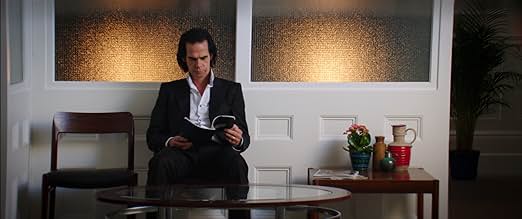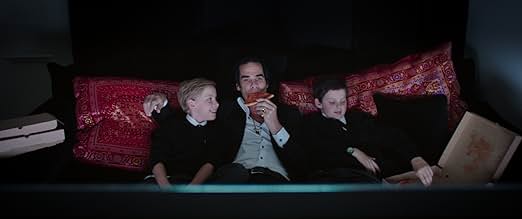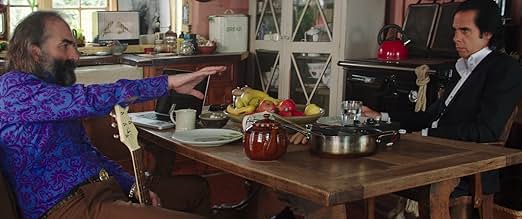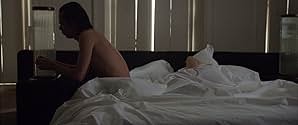- Nominated for 1 BAFTA Award
- 8 wins & 18 nominations total
Susie Bick
- Susie Cave
- (as Susie Cave)
- Directors
- Writers
- All cast & crew
- Production, box office & more at IMDbPro
Featured reviews
The only thing I've been introduced with when it comes to Nick Cave is his score for The Assassination of Jesse James by the Coward Robert Ford, which is pretty much my favorite film score ever. Such soothing, haunting, mesmerizing music. In many ways, this film is exactly like that. I always find it interesting when filmmakers play around with what a documentary really is, and this does just that. It's very melancholic in its tone, very introspective. It has fascinating examples of music being created and just how much Cave puts himself into his music, while still balancing it all and not coming off like an ego project. Even for non-fans this is recommended.
". . . The never-ending drip feed of eroticism" Nick Cave
I'm not sure either what that quote means, but what you may get is a sense of writer/musician Nick Cave's poetic inclinations and the sensuality of his life, encapsulated in a fictional day, his 20,000 day on earth to be specific. Starring him, of course, because he is the center of his universe, and he believes, maybe a deity or an angel. He once said about his creations: "I can't explain that dividing line between nothing and something that happens within a song, where you have absolutely nothing, and then suddenly you have something. It's like the origin of the universe."
This smooth fictional biography, partially narrated by Cave, first takes us in his fine car, which he always drives, to visit his therapist (scene so relaxed and interesting I wish we could have heard the results). Then lunching with band mate Warren Ellis, where the talk is mostly music, and over to an archive brimming with his memorabilia.
Interspersed are performances with The Bad Seeds, from his almost Leonard Cohen-like poetic music to his Jagger-like rocking in Sydney (he's an Aussie), where the capacity crowd is fully under his spell. As he speaks through the music about its transforming power, he also shows us his struggle to bring poems and lyrics together. He once said about author vs. musician: "Musicians are at the bottom of the creative pyramid and authors are at the top, and many people think it's unacceptable for someone to attempt to jump from the bottom to the top of the pyramid."
Along the way we see him and his sons eat pizza and watch Scarface. Although he seems to have little time for his family, when he does, it's relaxed just the way he presents himself to us in a film that gives much more insight into an artist's creative process than we usually get with bios.
"My music has to do with beauty, and it's intended to, if not lift the spirits, then be a kind of a balm to the spirits." Nick Cave
I'm not sure either what that quote means, but what you may get is a sense of writer/musician Nick Cave's poetic inclinations and the sensuality of his life, encapsulated in a fictional day, his 20,000 day on earth to be specific. Starring him, of course, because he is the center of his universe, and he believes, maybe a deity or an angel. He once said about his creations: "I can't explain that dividing line between nothing and something that happens within a song, where you have absolutely nothing, and then suddenly you have something. It's like the origin of the universe."
This smooth fictional biography, partially narrated by Cave, first takes us in his fine car, which he always drives, to visit his therapist (scene so relaxed and interesting I wish we could have heard the results). Then lunching with band mate Warren Ellis, where the talk is mostly music, and over to an archive brimming with his memorabilia.
Interspersed are performances with The Bad Seeds, from his almost Leonard Cohen-like poetic music to his Jagger-like rocking in Sydney (he's an Aussie), where the capacity crowd is fully under his spell. As he speaks through the music about its transforming power, he also shows us his struggle to bring poems and lyrics together. He once said about author vs. musician: "Musicians are at the bottom of the creative pyramid and authors are at the top, and many people think it's unacceptable for someone to attempt to jump from the bottom to the top of the pyramid."
Along the way we see him and his sons eat pizza and watch Scarface. Although he seems to have little time for his family, when he does, it's relaxed just the way he presents himself to us in a film that gives much more insight into an artist's creative process than we usually get with bios.
"My music has to do with beauty, and it's intended to, if not lift the spirits, then be a kind of a balm to the spirits." Nick Cave
The movie had a raw feel about it, an honest look at the creative process from the perspective of Nick Cave. It opened up a line of thoughts (as an aspiring musician) that transformed, inspired, questioned and transcended my way of writing. The pace of the movie was far from slow, (though obviously nor was it fast paced), it almost reflected Cave's musical writing style, a kind of creeping epic crescendo. The movie didn't fail to completely grip my friend, who I'd rate highly in terms of his cinematic knowledge (working in the industry), despite the fact that he hasn't really been exposed to much of Cave's work.
The cinematography was beautiful, with extremely unique transitions that somehow flowed scene to scene. The soundtrack was obviously excellent, with some stirring performances, I'm fairly certain there were a few slightly teary eyes in the cinema. Nick Cave was simultaneously eccentric, enigmatic yet very down to earth and heartfelt. I did feel his heartbeat.
The cinematography was beautiful, with extremely unique transitions that somehow flowed scene to scene. The soundtrack was obviously excellent, with some stirring performances, I'm fairly certain there were a few slightly teary eyes in the cinema. Nick Cave was simultaneously eccentric, enigmatic yet very down to earth and heartfelt. I did feel his heartbeat.
I really like Nick Cave. He has cameos in two of my all-time favourite films, The Assassination of Jesse James and Wings of Desire. His score for the former is my all-time favourite too, a collaboration with Warren Ellis of whom he's seen hanging out together here. This documentary, 20,000 Days On Earth, is perhaps coming a little too late or early to paint the most fascinating portrait of the rock artist, though it would have been a less catchy title. His last album is good, not great, perhaps played a little too safe. Nevertheless, his creative process is still interesting to watch as we're allowed access into the recording studio. But this isn't a straightforward documentary. It has bits of verite, fiction and interviews.
It's a shame the fiction isn't as well handled and it comes off as contrived and stilted, including when the mystical celebrity cameos keep Cave company in car journeys. It's the way the film is shot too which uses the type of photography that's fit for HD TV rather than cinema though it has its moments. However, it makes up for all that for being very insightful. The interviews are no holds barred with penetratingly honest questions. Cave explains that his biggest fear is losing his memory, and I wish the film took that as its primary thesis, looking into Cave's memory instead of an irreverent day in the life. It does have its trips into nostalgia and excels in those moments. 20,000 Days On Earth is still a very good doc thanks to its subject matter, but it needed more focus and guidance.
7/10
It's a shame the fiction isn't as well handled and it comes off as contrived and stilted, including when the mystical celebrity cameos keep Cave company in car journeys. It's the way the film is shot too which uses the type of photography that's fit for HD TV rather than cinema though it has its moments. However, it makes up for all that for being very insightful. The interviews are no holds barred with penetratingly honest questions. Cave explains that his biggest fear is losing his memory, and I wish the film took that as its primary thesis, looking into Cave's memory instead of an irreverent day in the life. It does have its trips into nostalgia and excels in those moments. 20,000 Days On Earth is still a very good doc thanks to its subject matter, but it needed more focus and guidance.
7/10
Any creative person needs to see this. Musician, writer, anything, if this film doesn't inspire you, then it will surely influence. Personally, Cave's very frank and fascinating philosophies on the creative process were stirring, moving even, especially when one of these ideas is laid out in the narration and followed by a very up close and personal live performance. Or, a ten minute, uninterrupted sequence of the band jamming out a song. It was in that latter scene you can see the conducting skills Cave possesses, as while playing the piano he is leading the band into the song's dips and crescendos. This look into the journey an idea goes on until it becomes a story, or a song in this instance, is almost intimate and extremely honest, while still managing not to spill too many beans. The unconventional nature of the film helps this aspect.
I really do think that if you write or create in any way, watch this film as soon as you can. I'm having to stop myself from going to see it again three days after i saw it. Note: this is not a documentary, but it isn't a movie either, as you'd normally think of it anyways. This film is most certainly unique, and one of the most thought provoking pieces of art that I ever ever seen, read or heard. Even his conversation with pop-singer Kylie Minogue (sp?) was interesting, as they candidly discuss different issues related to performing on a stage.
Not much action physically, but the way Cave is so spiritual about how he see and treats the creative process makes every second riveting. I didn't want it to end. For me, this was inspiring on a level that I have never felt before.
I really do think that if you write or create in any way, watch this film as soon as you can. I'm having to stop myself from going to see it again three days after i saw it. Note: this is not a documentary, but it isn't a movie either, as you'd normally think of it anyways. This film is most certainly unique, and one of the most thought provoking pieces of art that I ever ever seen, read or heard. Even his conversation with pop-singer Kylie Minogue (sp?) was interesting, as they candidly discuss different issues related to performing on a stage.
Not much action physically, but the way Cave is so spiritual about how he see and treats the creative process makes every second riveting. I didn't want it to end. For me, this was inspiring on a level that I have never felt before.
Did you know
- Crazy creditsThe credits are shown over a twilight scene of Brighton, shot from the sea.
- ConnectionsFeatures La Passion de Jeanne d'Arc (1928)
- SoundtracksCan't Get You Out of My Head
Written by Cathy Dennis and Rob Davis (as Robert Davis)
Performed by Kylie Minogue
Published by EMI Music Publishing Ltd and Universal/MCA Music Ltd
Licensed courtesy of Parlophone Records Ltd
- How long is 20,000 Days on Earth?Powered by Alexa
Details
- Release date
- Countries of origin
- Official sites
- Language
- Also known as
- 20,000 Days on Earth
- Filming locations
- Production companies
- See more company credits at IMDbPro
Box office
- Gross US & Canada
- $279,558
- Opening weekend US & Canada
- $27,879
- Sep 21, 2014
- Gross worldwide
- $2,128,486
- Runtime
- 1h 37m(97 min)
- Color
- Sound mix
- Aspect ratio
- 2.35 : 1
Contribute to this page
Suggest an edit or add missing content




























